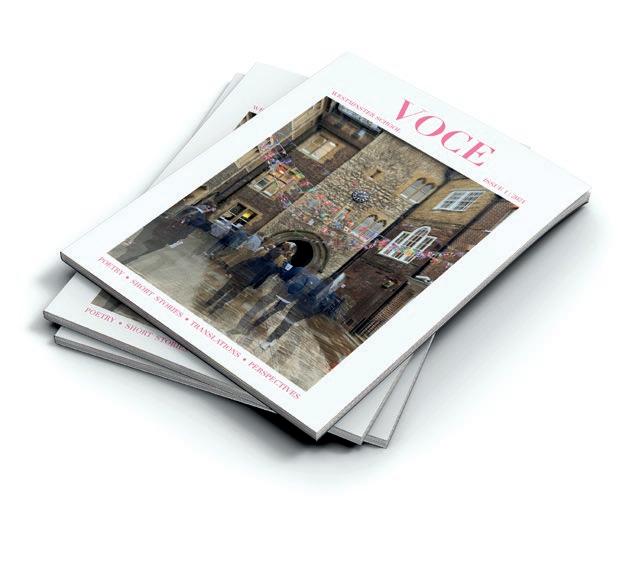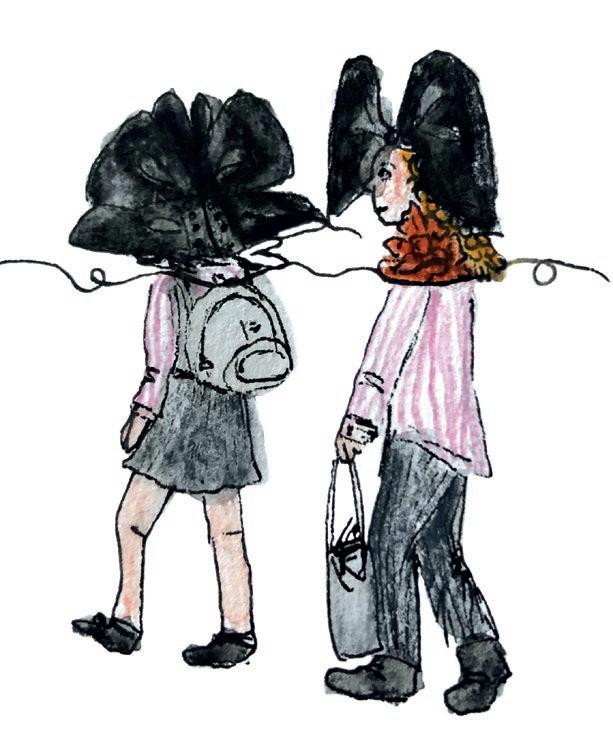
9 minute read
Voce: Our Pupil-led Magazine Excerpts
Voce
Our pupil-led magazine
Advertisement
Here are some excerpts from the inaugural edition of the pupil-run magazine ‘Voce’; dedicated to celebrating diversity at Westminster. To see the full edition please go to www.owconnect.com
Our Own Land
But we’ll lie in it and be it,that’s why, so freely, we call it our own.
– Anna Akhmatova, translated from the Russian by Richard McKane

The name of this publication aims to emulate the meeting of cultures within its pages. Voce means ‘voice’ in Latin, Italian and Romanian, ‘oar’ in Fijian, ‘fruit’ in Serbo-Croatian, and ‘you’ in Portuguese. Each of these meanings resonates with the freedom of selfexpression that we find in written words, both as writers and readers.
It is perhaps ironic that we must choose a language in which to write about our relationship with languages, cultures, nationalities; the act itself can feel limiting or like a declaration of allegiance. In discovering and defining our own land, many of these pieces therefore interweave English with phrases from mother tongues, vernacular and beyond.
At Westminster, we’re so used to the diaspora that surrounds us that we often forget to appreciate the backgrounds and memories of our classmates, teachers, and staff. These poems, short stories and personal reflections transport us across the world, from Argentina to Sri Lanka to Finland, while the translations from Russian and Ancient Greek are a reminder that time and language need not be barriers to understanding.
Diversity today is an undeniably charged word, carrying various political connotations in each of our minds. The word itself emphasises our differences, a source of inspiration for some and division for others. This magazine proudly celebrates the many nationalities, ethnicities, and ancestral roots upon which the modern Westminster School is built. Yet what makes each of these pieces so striking is not their removal from our own lives, but their familiarity: precious time with our grandparents, hope and self-doubt, the inexplicable warmth of hygge. At times, they remind us that we can still do better: diversity is at the core of the social harmony and intellectual growth that we so prize at Westminster, not in opposition to them.
The following works are jubilant, defiant, incisive, and reflective. Many explore the migratory journeys of their parents and grandparents as well as the complexities and frustrations of belonging. Most of all, they are proud reclamations of our unique identities, rooted in our common humanity as citizens of the world and as Westminsters.
Poetry
Sketch 1993
His studio is frayed and threadbare. The bookcases are overflowing – venerable volumes are stuffed into the narrow space. A grimy broom leans against the wall, breathing heavily after a difficult day. A simple bunk squats sadly in the corner.
He lies motionless. Slumped across the easel. The two moss-coloured plastic bags strewn on the floor. Vessels in which his entire being will be stored. Those sacrosanct 64 kilograms will tomorrow be all that he has left of six decades of toil. On his bed are masses of works, all stacked upon each other like the Tower of Babel – a charcoal self-portrait floats precariously above an oil pastel sketch. Another fleeting glance back at the sacks. Now he takes the role of his forefather Noah – forced to leave the majority behind. Only 20 pieces allowed; a derisory, almost laughable amount.
Born as Meyer, son of Yankel. Gradually mutated into Mikhail, son of Jacob.
As long as he has his tools, he will be neither excited nor resistant. The next promised land awaits. An anaesthetising numbness envelops him like a woollen rug.
My great-grandfather picks up his brush and starts to smear.
By Daniel
My great-grandfather was a very talented artist and part of the USSR Artists’ Union. When my family left the Soviet Union for America in 1993, he was forced to leave nearly all of his life’s work behind. The Soviet authorities allowed him to take only 20 pieces of art abroad, which was hugely difficult for him. He was a very isolated character and art was his preferred medium for expressing himself. I never managed to talk to him about his experiences because he died before my birth.
Not Just a Land of Snake-Charmers
Savour The cool mango lassi trickling down your throat The world-famous Chicken Tikka Masala, The multitude of enticing cuisines, from The kashmiri pulao of the North, to The masala dosas of the South, to The dhoklas of the West, to The fish curries of the East The endless variety of exploding flavours –India, indeed, has a strong taste.
India has a unique sight. Of pleading beggars in tattered clothes Of stray dogs and mooing cows Of littered streets and congested roads Of polluted skies Above slums and shanty towns.
Unbearable as it may seem, Instead of closing your eyes Wonder at –The majesty of the Taj Mahal The glitzy malls and Bollywood movies The preening peacocks dancing in the rain The vibrance of the bustling bazaars The lush and verdant jungles The towering snow-clad Himalayas and smooth sandy deserts The bright colours of Holi The dazzling diyas of Diwali A kaleidoscope of colours –India, indeed, has a unique sight.
India has a surreal feel, Of old and outdated traditions Of hectic rushes everywhere Of being lost in a crowd Of clutter and clamour Reminiscent of a bygone era. Unbearable as it may seem, Instead of cringing at the touch Experience –The pulsating energy of a cricket stadium The welcoming warmth of people The captivating cohesion of cultures The thriving metropolises The grit and determination of the youth The calm and peace of yoga An all-encompassing sensation of spirituality -India, indeed, has a surreal feel, Felt only by opening your heart and mind to it.
By Aarav
Short stories
Semo Paroni
“Semo Paroni” is a dialectic expression from the Veneto region of Northern Italy. Literally translated, it means, “We are the bosses”, but it comes to mean, “We can do whatever we want, we’re in control”. It has an impish feel and conveys a sense of independence above convention or reason.

Alvise only bought the ticket on the spur of the moment, because the woman at the newsstand couldn’t find the right change for his Gazzetta dello Sport. He never really thought he would win “The Holiday Weekend of Your Dreams”. He just filled in the entry form with his address, put the ticket in his pocket, and forgot all about it.
Fast forward two weeks and three days. A man with an Armani suit that must have cost more than the average Lamborghini and a moustache that had been gelled into shape at least four times that morning showed up on Alvise’s doorstep. He was brandishing what looked like some strange cross between a golden ticket and a Domino’s pizza ad. Alvise didn’t quite know what was going on but began to feel slightly queasy. “Con-gra-tu-lations,” moustache-man intoned, “Youuu have won the holiday weeeeek-end of your dreams!”
Carlotta heard the noise and was walking towards the commotion from the kitchen where she had been making herself a cup of barley coffee, because she wanted to cut down on caffeine and was looking forward to a quiet weekend at home. Carlotta is like that: she likes it quiet and easy. Alvise intercepted her on the stairs and explained rather sheepishly that he had won a lottery and that they were going to be spending the weekend in the poshest and most glamorous hotel around Treviso, the Villa Mocenigo Resort. After the volcanic eruption filled with “Why?-what’swrong-with-a-weekend-at-home-o!” sulphate gas had subsided, Alvise reluctantly went downstairs and told the man that they were over the moon and coming immediately. They changed into their best clothes and rode off to the hotel in their Vespa. They were warmly greeted at reception, where an awkwardly attractive receptionist informed them that their “common wearing apparel simply wouldn’t do”, and that they “would have to change into some more suitable attire.” Of course, they didn’t have anything she would have found acceptable, so they weren’t allowed down to dinner and had to take it in their rooms. This did, however, have a considerable plus side, especially for Carlotta: they didn’t have to meet any of the other guests. The room itself was large enough for a king to live in, and, as the swathes of waiters and chamber maids and roomservice attendants made sure they wouldn’t forget, that was because one had (Umberto I between the years of 1872 and 1890). Then a camera crew burst in to take photographs of “The Lucky Winners” to put in the local newspaper. Enough was enough. Imagining themselves on the front page of the Eco di Treviso was just too awful. Carlotta and Alvise looked at each other. “Just a second,” said Carlotta, deftly picking up their duffle bag and giving Alvise a Significant Look. They calmly left the room, leaving everyone behind, speechless and in disbelief.
Alvise and Carlotta jumped onto their Vespa – Alvise riding pillion behind and Carlotta doing the steering, because Alvise was never too comfortable switching above third gear. They rode off into the sunset, stopping only to give their “golden ticket” to the man at the gas station because they had no money to pay for fuel. They looked at each other, laughed, and Alvise said, “Dai, Carlotta, semo paroni.”
By Sebastiano

Hygge and What it Means to Me
Hygge is a feeling, not a thing. It is an indescribable, untranslatable word. It’s the feeling of waking up on your birthday knowing that you have a whole day ahead of you. It’s the feeling of waking up on Christmas day and running downstairs to open gifts with your family. It’s the feeling of being with people who you care about and people who care about you. It’s a bizarre word: you can’t know it unless you live it, and you can’t really live it unless you know it. And the strange thing about it is that you don’t know if it feels the same for you as it does for other people.
It’s the sort of word that you will never ask what it means. Asking someone to describe it in a finite number of words is impossible. It’s like describing happy or sad.
When I was little, I would never ask my mum what hygge meant even though I had never come across the word. It’s as if you’re born with it, it’s a natural feeling. The only way to feel it is by being there, in the moment.
You would and should never ask a Dane what it means, as they will look strangely upon you. But if you ask a person of a different nationality what it means they wouldn’t even recognise the word.
For me, hygge is being with my family, whether that is my siblings and I or if I’m together with my grandparents and my cousins. The one prominent moment that comes to head when I think of hygge is playing cards with my parents while the fireplace is crackling on Christmas Eve. It’s being with the people you love and enjoying yourself. Hygge is a feeling that surrounds you and embraces you.
By William










